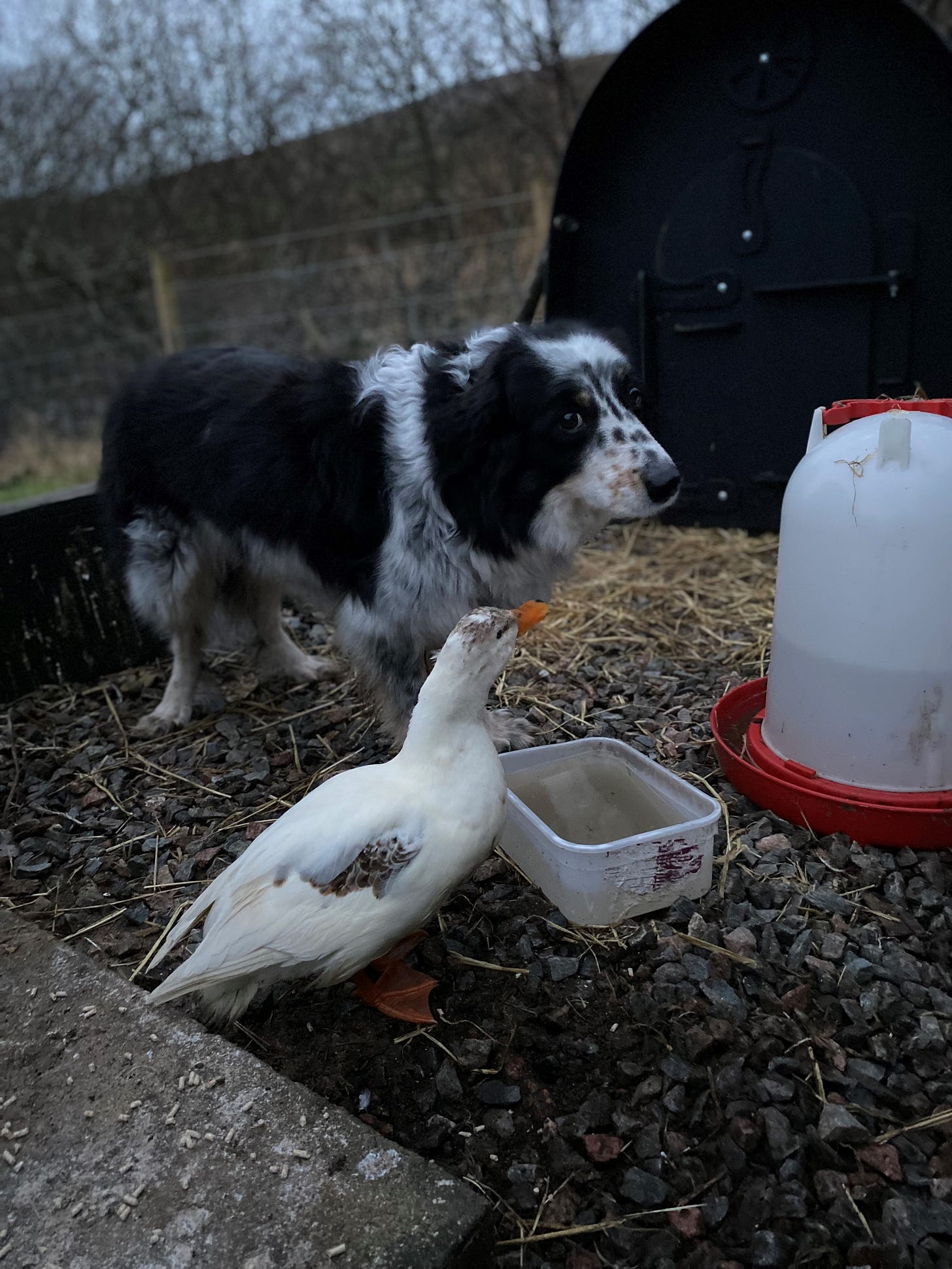Growing up, one of my fondest memories is of listening to my dad play guitar and sing to us. There was one song that always stood out to me as a favourite —The Fox Went Out on a Chilly Night. It’s a folk tune, and Dad always sang it in a way that made the tale come alive.
The song tells the story of a cunning fox who ventures out on a cold night in search of food. The melody is simple, but the rhythm carries a sense of urgency, mirroring the fox’s stealthy pursuit as he sneaks into the farmyard, eyes on the prize - some plump, unsuspecting ducks or geese. Dad’s voice would rise and fall with the narrative, painting vivid images of the fox’s wild adventure in my mind. I could almost see the moonlight glinting off the fox’s fur as he dashed through the night, and the panic of the ducks and geese as they quacked in alarm.

Fast forward to now, and I have a flock of 12 ducks of my own. They waddle freely around the garden, quacking contentedly and are very much-loved pets. But as endearing as they are, they also remind me of that old song - and of the cunning foxes that roam the surrounding countryside.
One day this week, as I was working from home on the laptop (yes, even we rangers have paperwork to do!), I heard a commotion outside. Glancing up from the screen, I spotted what I thought was a strange dog outside in the garden. It took a second or two to process that what I could actually see was a fox, and in its jaws was our beloved 12 year old duck, Katy.
For most poultry keepers, the red fox (Vulpes vulpes), with its striking red fur and sharp, intelligent eyes is very much an enemy. The scientific term vulpes comes from the Latin word for fox, and in Scottish Gaelic there are two commonly used names for a fox: Sionnach (Shunnoch) and Madadh-ruadh (matta roo-ah) which means “red dog”.
It’s remarkable adaptability, resilience, and survival instincts in fact make the fox the most numerous and widespread predator in Britain. But as a countryside ranger, I understand that its not really an enemy – we must understand that we moved into the foxes territory, and it has every right to be there as a native Scottish mammal. Males typically measure just over a metre, including their bushy tail, while females are slightly smaller. The one with our duck in its jaws, was a male.
Despite their small size, red foxes are agile hunters and omnivores, with a diet ranging from small mammals and birds to insects and fruit. In urban areas, they often scavenge leftovers. Contrary to myth, they rarely prey on cats, with a cat often being more than a match for a fox in a confrontation. However unsecured pets like rabbits or guinea pigs (and ducks!) are definitely at risk.
I don’t know if it was the adrenaline or the fact that Dad’s voice was playing in my head, but I reacted quickly, rushing to the door and charging outside. Shouting to my husband and our ‘duck guardian’ dog Tessa, we all gave chase across the garden. Eventually we cornered the fox, screaching and shouting at it to let the duck go.
For a moment, it seemed like he would bolt with our duck in tow, but thankfully, our rabble rowsing noise and the dogs presence were enough to spook him. He reluctantly dropped the duck and slinked off through the grass.
Incredibly, Katie the duck was shaken but unharmed, and I cried a wee tear of relief as I scooped her up and took her into the house to check her over. She gave a few loud quacks, shook her tail and seemed to wonder what all the fuss was about!
Socially, foxes live in small family groups but often hunt alone. Their territory size varies significantly, from 25 hectares in cities to 4,000 hectares in rural areas.
Foxes breed annually, with cubs born in spring. These cubs rapidly mature and often leave to establish their own territories by autumn. However, survival is challenging, with a high mortality rate in the first year.
Historically persecuted for its fur, the demand for fox fur has declined, and fox hunting with hounds is now banned in Britain. Nevertheless, between 1995 and 2022 the rural population of foxes has declined by 48%. Factors vary, from ongoing persecution and road deaths, to a decline in prey such as rabbits.
However, Red Fox’s overall population is now considered stable - in part due to strong urban populations, and scavanging behaviour.

Life has a funny way of bringing songs to life, though doesn’t it?
That night, after rescuing Katy, I felt an even deeper connection to the song Dad used to sing, as if it had come full circle—like some kind of folklore becoming real.
When I told Dad about it later, he laughed, teasing me by asking “quack, quack, quack - were the legs all dangling down-o?".
The fox…..the duck…..the legs all dangling down-o - it was all there, just as he’d sung it all those years ago.
It’s funny how a song can become more than just a tune - it can become part of your story, part of your life.
The fox went out on a chilly night,
he prayed to the Moon to give him light,
for a many a mile to go that night
before he reached the town-o, town-o, town-o,
many a mile to go that night
before he reached the town-o.
He ran till he came to a great big bin
where the ducks and the geese were put there in.
"A couple of you will grease my chin
before I leave this town-o, town-o, town-o,
a couple of you will grease my chin
before I leave this town-o."
He grabbed the grey goose by the neck,
threw the duck across his back;
he didn't mind their quack, quack, quack,
and their legs all a-dangling down-o, down-o, down-o,
he didn't mind their quack, quack, quack,
and their legs all a-dangling down-o.
The old gray woman jumped out of bed;
out of the window she cocked her head,
Crying, "John, John! The grey goose is gone
and the fox is on the town-o, town-o, town-o!"
Crying, "John, John, the grey goose is gone
and the fox is on the town-o!"
He ran till he came to his cozy den;
there were the little ones eight, nine, ten.
They said, "Daddy, daddy, better go back again,
'cause it must be a mighty fine town-o, town-o, town-o!"
They said, "Daddy, daddy, better go back again,
'cause it must be a mighty fine town-o."
Then the fox and his wife without any strife
cut up the goose with a fork and knife.
They never had such a supper in their life
and the little ones chewed on the bones-o, bones-o, bones-o,
they never had such a supper in their life
and the little ones chewed on the bones-o.
Personally, I think our fox visitor has earned his place within our landscape, and it is up to me to ensure my ducks are protected from any predators. The fox that visited us was a youngster from this year – small in size and still quite brown rather than the classic red colour of a mature fox.
The fact he was hunting in the daytime further backs up this theory that he is young and inexperienced, and hopefully his encounter with us and the dog, and the fact he didn’t get the meal he was after, will mean he will move on and find a new territory to hunt in.
For now my ducks are not living quite the “free range” lifestyle they were accustomed to. Confined to a smaller fox proof area near the kitchen door most are unhappy with the change, however old Katy seems content in her new, secure accomodation.
Here's hoping that the fox has decided that our garden is not a good place for hunting, and our ducks can get their freedom back some time in the near future. But I also hope that the fox survives to go out on many a chilly night, and his little ones can chew on the bones-o…….as long as those bones don’t belong to any of my ducks!
Eilidh-Ann Phillips has been a countryside ranger in the wild, captivating expanse of West Lochaber since 1996. Now, as the High Life Highland Senior Ranger for South Highland, she is integral to a vibrant network that connects communities and schools to the nature, inspiring a collective appreciation for wildlife and heritage. Under her guidance, a team of commited rangers across South Highland is dedicated their time to conserving the region's stunning beauty and wilderness, nurturing the next generation of guardians for the area’s breathtaking landscapes.







I love foxes, but I'm very glad Katy survived her encounter!
This is such a lovely, touching blog piece